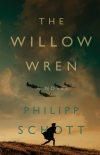The Willow Wren by Philipp Schott (electronic book reader TXT) 📗

- Author: Philipp Schott
Book online «The Willow Wren by Philipp Schott (electronic book reader TXT) 📗». Author Philipp Schott
At the Leipzig station we were met by old family friends, Herr and Frau Buheitel, whom we spent the night with. The next morning they took us back to the station to meet Mama, Oskar and Paul, who had taken the early train out of Colditz after spending the night on the two remaining bare beds and a beat-up old chaise longue that we had not tried to sell. We greeted each other with nervous smiles and looked for the train to Halberstadt. The adventure was now truly underway.
We were going to Halberstadt because, after some debate and consultations with various people who knew something about illegal border crossing, we had decided to cross through Osterwieck, which is the last town west of Halberstadt before the border, just immediately north of the Harz Mountains. This was the solution I had pushed for. The mountains themselves would have been too tough for the little ones and I was even a little worried about Mama. Despite the improvement in our nutrition, we were still short of protein and vitamins and she did not look good, presumably also because she worked harder and worried more than any of us. The country lanes and fields west of Osterwieck would be easier to walk across, although they would also be more heavily patrolled. I thought it was a reasonable trade-off, especially as we planned to cross in the night and were used to walking through fields, unlike many of the big-city people who were trying to escape.
From Halberstadt we took a smaller train to Osterwieck. This was the end of the line as no tracks crossed the zone frontier anywhere other than the one line to West Berlin (when the Soviets allowed that to operate). This train had a few young men with empty backpacks on it. This struck me as odd, but as I was not one to engage strangers in conversation, I just tried to puzzle it out for myself. One of them noticed me staring and smiled.
“You’re wondering about our empty bags, aren’t you?”
“Yes, I apologize.” I was embarrassed that he noticed my interest.
He laughed. “We are herring traders! There is almost no fresh fish to be had here in the East, but they have plenty in the West, so we sneak over one way with empty bags and sneak back the other way with our bags full of herring, fresh caught from the North Sea and brought by the morning train from Bremerhaven to Vienenburg.”
“Is that not dangerous?”
The young man smiled. “Yes, it is dangerous, but we know the best way over, and regardless it is definitely worth it. The price of herring is so low in the West and so high in the East!”
I nodded and then settled into thinking about how the train must smell on the way back from Osterwieck. This was yet another reason to be happy that we were going west one-way. I considered asking him about this “best way over,” but my instinct told me that they would not welcome a gaggle of noisy little children tramping down their secret route.
It seemed that very few people came to Osterwieck for any reason other than to try to sneak over the border. That should not have been a surprise to us, but somehow the implications of this particular aspect of our plan were not something we discussed. Part of it might have been that Osterwieck was smaller than we expected. Mama and I both assumed that we could just get off the train, leave the station quietly, do our best to avoid attracting suspicion and then keep a careful eye out for the VoPos and for the more fearsome paramilitary DGP (Deutsche Grenzpolizei, the border patrol). “Just a family out for a hike in the beautiful countryside.” Hence the relatively small backpacks, just like hikers, and the lack of other baggage. I did not think we looked like refugees, certainly not like the people I had seen fleeing Silesia at the end of the war.
But it was not to be. The train was met by a large contingent of VoPos armed with rifles that dated from the 1870 Franco-Prussian War, similar to the ones I remembered from the KLV-Lager. All the passengers were herded into a fenced-off area beside the station. Those of us who could not prove we were from Osterwieck or who could not provide another plausible and verifiable reason for being here were then herded down the road a short distance to an abandoned farm. We were ordered into the barn where presumably it would be easier to keep an eye on us as there was just the one door to guard. The rifles may have looked almost comically old, but there was nothing in the slightest bit comical about the attitude of the VoPos. There was no doubt that they would use their weapons if they felt the need. I knew that bullets fired from old rifles would kill you just as effectively as those fired from new ones.
It was about five p.m. when we arrived at the barn. There were perhaps fifty of us in there. We all stood around for a moment, taking in the dirt- and manure-covered floor and the handful of short benches that could accommodate only a fraction of us. However, before we had a chance to deal with this, a DGP officer came into the barn with several men. He pulled one of the benches up to a crude table and began the process of registering us. Everyone in occupied Germany had to carry identity papers with them at all times. The penalties for not doing so were quite severe. The officer carefully examined all of our documents and entered





Comments (0)